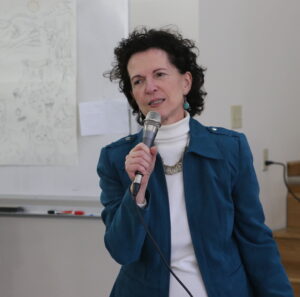Myra’s cutting-edge training sessions are filled with practical techniques reflecting her research knowledge in social work, resilience theory, and practice, gerontology, trauma, and neuroscience. A strengths-based philosophy is the foundation for her practice. It asserts that human beings are resilient and continue to learn, grow, and change throughout their lives, despite trauma and hardships (Kisthardt, 2006; Greene, 2010).
1. Developing a Resilient Mindset
Myra’s work with Holocaust survivors has taught her valuable personal and professional life lessons about adaptation, coping and resilience that can benefit anyone experiencing adversity and or challenges – big or small. She shares these lessons with individuals, groups, and organizations through her talks, workshops, and webinars. Myra’s passion is helping people tap into their resilient mindsets as they cope with life’s challenges.
Here is a list of workshops she has given:
- Defining resilience
- Resilience: a learned or innate behaviour
- Lessons Holocaust Survivors teach about resilience
- Research findings on protective factors that reduce stress to make us more resilient
- Practical tips to develop a resilient mindset
2. Understanding and Interacting with Survivors
Helps participants understand survivors and gain confidence in their interactions with them. Healthcare and social service providers will enhance their knowledge and improve their skills in working with survivor populations.
Participants may include:
- Social service and healthcare providers
- Homecare workers
- Family and friends of survivors
- Non-healthcare groups who work with survivors including:
- Writers and documentary filmmakers
- Students and teachers participating in intergenerational programs
- Individuals planning to interview survivors about their experiences
- Community-sponsored activities
- Memoir projects
A workshop may be customized to include:
- Understanding the historical context
- Psychosocial issues (e.g. caregiving, institutionalization, bereavement)
- Demographics and diversity
- Impact of trauma
- The impact of aging on traumatic memory
- Practice issues pertaining to survivor populations
- Preventing and responding to environmental triggers
- Integrating strengths-based theory into practice
- Person-centered trauma-informed practices
- Vulnerability and resilience
- Trauma-informed programs, services, and interventions that empower survivors
- Specialized survivor-assistance resources
- Complementary and alternative therapeutic approaches
Click here to see past workshops
3. Self-care Practices
These workshops are designed for social service and healthcare providers in the public and private sectors.
“I believe that training in self-care is necessary to deal with the potential hazards of our professions. Stress, burnout, and vicarious trauma make us less effective in our work. Self-care practice mitigates these stressors and improves our well being by helping replenish and regenerate our internal resources.” Myra Giberovitch, Recovering from Genocidal Trauma
Workshop topics may include:
- Stress reduction
- Relaxation techniques
- Mind-body techniques
- Wellness strategies that integrate a mind/body/soul approach
- Vicarious trauma and its prevention
- Vicarious resilience
Myra’s Flyer.
Click here to request more information
References:
Greene, R.R. (2010). Holocaust survivors: Resilience revisited. Journal of Human Behaviour in the Social Environment, 20(4), 411-22.
Kisthardt, W.E. (2006). The opportunities and challenges of strengths-based, person-centered practice. In D. Saleebey (Ed.), The strengths perspective in social work practice (4th ed., 171-96). Boston: Pearson Education.




